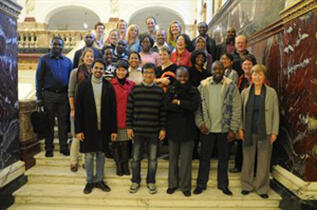
REACHOUT, a multi-country project coordinated by LSTM, held its first annual meeting in Amsterdam, the Netherlands, earlier this month. REACHOUT’s research aims to understand and further develop the role of close-to-community health care providers in preventing, diagnosing and treating major illnesses and health conditions in rural and urban areas in Africa and Asia.
The volume of work undertaken by REACHOUT is impressive. Over the past 9 months they have put in place a strategy for capacity building under the leadership of James P Grant School of Public Health; created Country Advisory Groups of critical allies in each research setting; held stakeholder meetings; formed anExpert Review Group for the Consortium as a whole; put in place systems for management of the project; secured ethical approval for their context analysis; collected data from each country and conducted analysis; finished a literature review; attended and presented at international conferences; and they are on the way to finalising their communications and research uptake plan.
Initial research presented during the meeting by the participating countries demonstrated that work to improve close-to-community services is sorely needed:
Malawi Health Surveillance Assistants (HSAs) are highlighted as a key cadre to deliver the essential health package as part of the sector wide approach. But there are challenges in terms of supervision and coordination and their roles and responsibilities often change. HSAs often complain of inadequate salaries and supplies such as pens, gum boots and registers.
Ethiopia Salaried health extension workers (HEWs) are supposed to work on 16 health packages and because they have so many tasks to do their workload is high. The area that they have to cover, and the population size they are responsible for, influences their capacity to deliver services in the community.
Kenya The Community Health Strategy is currently in a state of flux and training curricula and a monitoring and evaluation strategy are being developed which creates particular challenges for Community Health Workers (CHW) and Community Health Extension Workers (CHEWs).
Mozambique The country’s Agente Polivalente Elementares (APEs) face challenges in terms of deficient supervision, pressure from donors to expand the APE responsibilities into other areas of health, stock outs of medications and other supplies, late payments of subsidies, large numbers of clients dispersed over wide areas and the fact that communities would like them to provide curative services too.
Indonesia A lack of clear supervisory systems, information feedback loops, and follow up on problems (such as equipment breakdown and building management) are a problem. Whilst there is a universal insurance system that covers ANC visits, delivery and post-natal care, women are still not delivering in a facility because of the distance from health facilities, poor road access for ambulances and other transport means and a preference for delivering at home.
Bangladesh A pluralistic health system characterised by an inappropriate skill-mix with inequitable distribution of providers including traditional healers, TBAs, and village doctors, means that there is poor linkage between formal and informal providers. A lack of oversight creates difficulties in providing joined up and appropriate services at the community level.
Moving forward Participants left the meeting full of ideas for how their research might roll out and with a renewed sense of solidarity about how they can work together and help each other grow. REACHOUT’s next meeting will take place at Mozambique’s University Eduardo Mondlane in 2014.
REACHOUT is funded by the European Union.